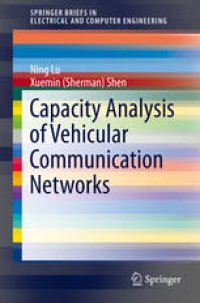
Ebook: Capacity Analysis of Vehicular Communication Networks
- Genre: Technique // Transport
- Tags: Computer Communication Networks, Communications Engineering Networks, Power Electronics Electrical Machines and Networks, Computer Systems Organization and Communication Networks
- Series: SpringerBriefs in Electrical and Computer Engineering
- Year: 2014
- Publisher: Springer-Verlag New York
- Edition: 1
- Language: English
- pdf
This SpringerBrief focuses on the network capacity analysis of VANETs, a key topic as fundamental guidance on design and deployment of VANETs is very limited. Moreover, unique characteristics of VANETs impose distinguished challenges on such an investigation. This SpringerBrief first introduces capacity scaling laws for wireless networks and briefly reviews the prior arts in deriving the capacity of VANETs. It then studies the unicast capacity considering the socialized mobility model of VANETs. With vehicles communicating based on a two-hop relaying scheme, the unicast capacity bound is derived and can be applied to predict the throughput of real-world scenarios of VANETs. The downlink capacity of VANETs is also investigated in which access infrastructure is deployed to provide pervasive Internet access to vehicles. Different alternatives of wireless access infrastructure are considered. A lower bound of downlink capacity is derived for each type of access infrastructure. The last section of this book presents a case study based on a perfect city grid to examine the capacity-cost trade-offs of different deployments since the deployment costs of different access infrastructure are highly variable.
This SpringerBrief focuses on the network capacity analysis of VANETs, a key topic as fundamental guidance on design and deployment of VANETs is very limited. Moreover, unique characteristics of VANETs impose distinguished challenges on such an investigation. This SpringerBrief first introduces capacity scaling laws for wireless networks and briefly reviews the prior arts in deriving the capacity of VANETs. It then studies the unicast capacity considering the socialized mobility model of VANETs. With vehicles communicating based on a two-hop relaying scheme, the unicast capacity bound is derived and can be applied to predict the throughput of real-world scenarios of VANETs. The downlink capacity of VANETs is also investigated in which access infrastructure is deployed to provide pervasive Internet access to vehicles. Different alternatives of wireless access infrastructure are considered. A lower bound of downlink capacity is derived for each type of access infrastructure. The last section of this book presents a case study based on a perfect city grid to examine the capacity-cost trade-offs of different deployments since the deployment costs of different access infrastructure are highly variable.